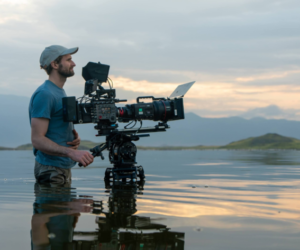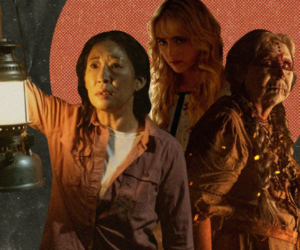Ever since the Chernobyl NPP disaster more than 33 years ago, there has been a steady flow of media that either chronicles the events, or attempts to build stories out of the aftermath of the events. There have been numerous documentaries, some better than others, a number of videogames (the Stalker series, building upon the 1986 disaster, while likewise rooted in the novel by Arkady and Boris Strugatski, Roadside Picnic) and even a number of less than refined horror films which seem to have found the exclusion zone to be a good excuse to justify the presence of mutated zombies. There has always been a sort of fascination with the Chernobyl disaster, partly explained by the flocks of tourists who pay to be guided around in the ghost town of Pripyat for a couple of hours. And yet, there was nothing really remarkable, either in cinemas, or on TV screens, baring the name Chernobyl somewhere in its title. Until about a month ago, that is.
Game of Dosimeters
The final Game of Thrones intro sequence rolled a few weeks ago, and many people were left wondering what to do with their lives, now that HBO had taken away a long-lasting source of intrigue and entertainment. And, even though a semi-documentary about nuclear energy set in the Soviet Union find itself rather far away, thematically speaking, from a dramatic power struggle in a fantasy kingdom governed by supernatural forces, the two ideas do not necessarily mutually exclude one another. For one, politics has and will always be a power struggle. And second, there might not be any supernatural beings in the mix when talking about Chernobyl, but the Soviet-style communist regime was certainly something out of this world.
Enter Chernobyl, a 5-episode mini series which chronicles the nuclear power plant explosion from April 1986, and chiefly the efforts undertaken in order to prevent a larger tragedy from occurring. It mostly follows the exploits of Valery Legasov, a prominent member of the Soviet Academy of Sciences, and Boris Yevdokimovich Shcherbina, the Deputy Chairman of the USSR Council of Ministers – the former as the voice of reason, while the latter initially coming off as a staple of the rigid, absurd communist-style leadership, then gradually becoming more aware of reality in all its seriousness. While I am in no position to critically assess the accuracy of the portryals, it seemed to me like a good analogy to Gorbachev’s leadership – a flirt with reason which eventually brought about the end of an era.
Chernobyl and so much more
What Chernobyl gets right, first of all, is how it structures its storytelling. About three main narratives are presented from the very first episode, and continued throughout. Though taking many different forms throughout the series’ duration, and intertwining at times, the perspectives employed are three in number. One deals with the situation at hand and the manner through which it was directly tackled, another revolves around the outside view toward the event, either in the USSR or the rest of the world, and the third one looks at the long-lasting societal impact the nuclear disaster caused. Additional secondary story arcs are opened and closed throughout the five episodes, each serving to both present a reality, and equally to evoke a feeling. All of them are fantastically shot and developed, with some even passing the masterpiece threshold – the opening of episode 4, for instance, is one of the best couple of minutes I’ve seen on TV in years.
Facts and figures about the explosion are there, scientific explanations abound, and whether or not they’re 100% accurate is irrelevant. The reactor and Pripyat scenes are shot at a very similar-looking installation in Lithuania – since the exclusion zone is not exactly safe for weeks of shooting – but that does not take the authenticity away from the series. In fact, both the storytelling and artistic approaches have been highly praised by Ukrainians and Russians alike – you only need to open up the review section on IMDb and start scrolling down to notice that.
Even if it only managed to accomplish this, Chernobyl would have been a great success. However, it managed to go one step further and flawlessly established the macro context as well. You might think that the series is about a nuclear disaster, and you would be right, but it is also essentially about humans, humanity and human nature. And it accomplishes this ever so subtly, without needing tons of archive footage, quotes or explanations. Instead, simple scenes, which may otherwise feel insignificant to the story at hand, manage to explain why people are behaving in certain ways, taking certain decisions, and refraining from taking other decisions. The show mocks the communist power structure in the subtlest of ways, showcases the propaganda apparatus in all its absurd splendour, and exhibits the extent to which a lie can be stretched in order to protect the pretense of an even greater lie.
Bloody brilliant
It would be very difficult to criticise Chernobyl, since it hardly puts a foot wrong. My only objection, albeit subjective in nature, relates to the decision to have all the characters speak in a variety of British accents. As someone who highly values authenticity, this has constantly irked me throughout the entirety of my viewing experience. Naturally, this is probably a better choice than having all characters speak in broken English with as few definite articles as they could. Sure, British accents in a Soviet setting worked like a charm in The Death of Stalin, a parody. But, under this specific context, and especially considering the extraordinary effort put into making the environments, the outfits, and the general atmosphere feel fully authentic, the accents feel like a slap in the face. For me, the solution would have been extremely simple: Ukrainian/Russian language, English subtitles.
But not even that can make my love for Chernobyl dwindle even one bit. I would dare say that it’s not exactly the best TV series in the history of TV series, as seems to be the case if you head over to IMDb and look at the aggregate ratings, but it’s a wonderful example of how you can achieve great results with little ‘in-your-face’ drama, no cliffhangers, and a low number of episodes. Ah, it’s been a pleasure.
TMFF RATING:

















